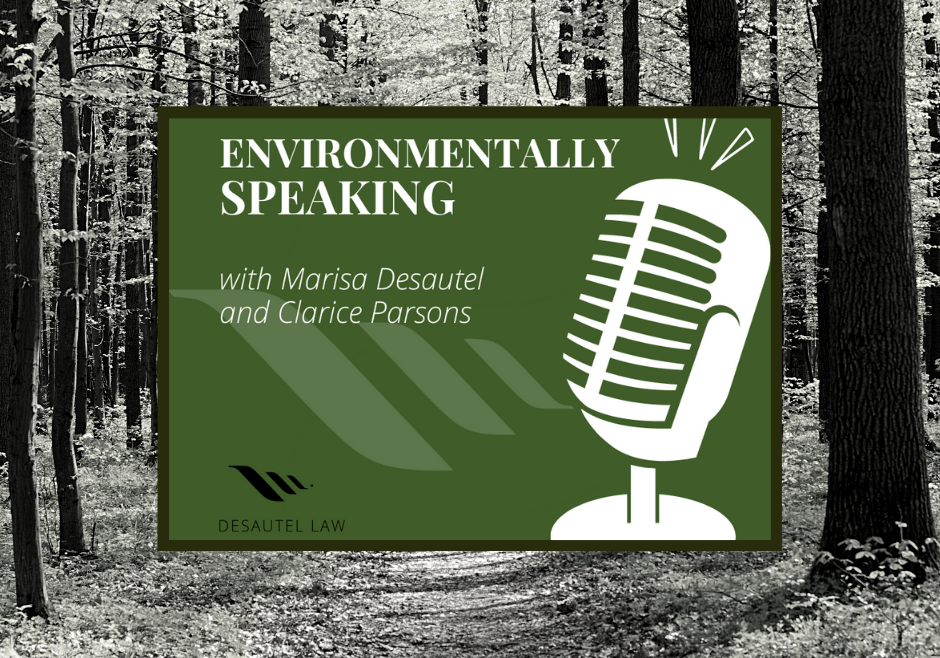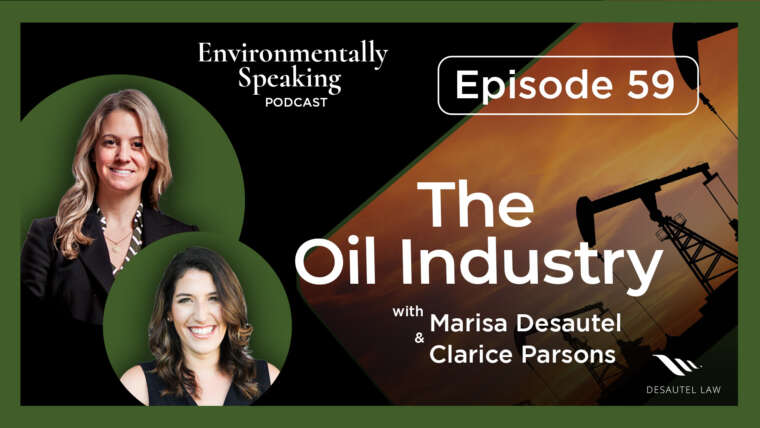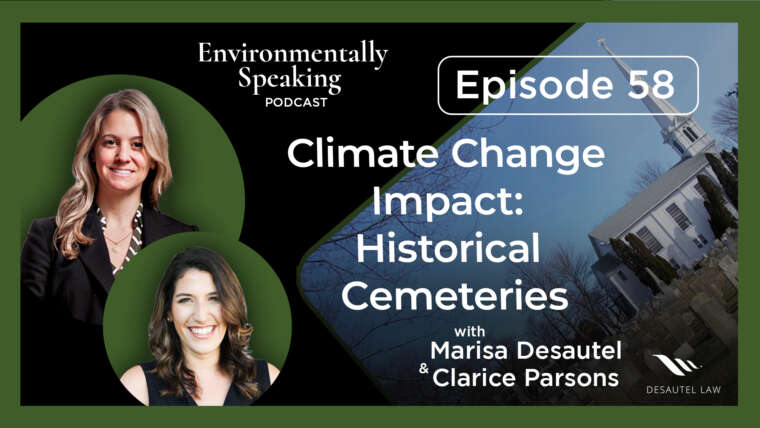Methane and carbon emissions are a big issue for everyone on the planet because they result in greenhouse gas increases which then contributes to the warming of the planet as a result of our atmosphere warming up, so it’s a major problem.
EP 23: Carbon Footprint
CLARICE: Hello, everybody. Welcome to today’s episode of Environmentally Speaking. Full disclosure, we are on take two. I was a little too peppy first round. So to brace Marisa –
MARISA: No. And I forgot what we were doing altogether, so. So we’re recording in the afternoon which is what Clarice was talking about in the context of having a little more energy. Customarily we record early, early in the morning before the workday, but schedules being what they are we are coming at you on a Friday afternoon so a little more energy.
CLARICE: Maybe that’s why we record in the morning, too. Maybe I’m just a little too peppy to be an afternoon recorder.
MARISA: We’ll have to see how this goes over.
CLARICE: It’s true.
MARISA: Folks might be less inclined to deal with us in this.
CLARICE: A little too happy in the morning. I don’t know how I feel about afternoon Clarice. She’s a whole new level.
MARISA: How much coffee have you had?
CLARICE: I don’t want to talk about how much I’ve had.
MARISA: Fine. That’s fine.
CLARICE: Yeah. Plenty.
MARISA: Moving on.
CLARICE: If there’s a shortage I’m sorry.
MARISA: So this is Environmentally Speaking. I am Marisa Desautel an environmental attorney with a few decades of experience.
CLARICE: And I am Clarice coming at you with your questions, comments, topics, and extra espresso today. And today I wanted to talk about carbon footprint. I was thinking of different ideas and things we could talk about and I was listening to a podcast not too long ago. It was This American Life. If you haven’t listened to it, it’s a staple and a classic. But there was this story about a man who had decided to dedicate his life to living carbon neutral and having an almost zero footprint.
And in the story it talked about his relationships with his family members and other people kind of reacting to his lifestyle. And he had promised to change his diet completely. He had promised to never travel on a plane again. And it just got me thinking he was making all of these drastic changes and yet I don’t fully grasp the – what a carbon footprint is and what living carbon neutral is. And I think if we had a better understanding of that, maybe – I can’t promise I’ll never go on a plane again, but maybe there are some small tweaks that we could all make to be a lighter footprint.
[0:02:31] MARISA: Yes. A great topic and I think it dovetails nicely with the Rhode Island governor’s budget that just came out yesterday which contemplates various ways in which the state and its residents can also decrease their carbon footprint. So what is a carbon footprint? I’m sure everyone – well, I think everyone has probably at least heard that term before, but what does it actually mean? So every creature, living thing for the most part on the planet creates emissions. And we’ve all heard about agriculture as being – I don’t know why I keep saying we’ve all heard about and I hope we all know. No. Most people don’t know. That’s why we’re doing this podcast, so let me back up.
In case you don’t know, methane and carbon emissions are a big issue for everyone on the planet because they result in greenhouse gas increases which then contributes to warming of the planet as a result of our atmosphere warming up, so it’s a major problem. The sources of emissions that the carbon footprint contemplates includes airplane travel as you just indicated because of the emissions that come from airplanes, what food source you are using.
If you are consuming meat, you are then supporting an industry that allows for methane emissions from cows. Other sources of emissions, the car that you drive, whether or not you live in a house or an apartment. So these are considerations where if you are looking to be carbon neutral you would take a look at the way you’re living your lifestyle and determine whether or not you could make changes to your lifestyle or daily activity that would result in less emissions.
CLARICE: So by nature we’re just in terms of diet, daily life, everyday functioning, carbon emissions are – and our footprint is kind of built into that. So it’s something that’s kind of always happening much like how we are always going to work or, you know, eating or, you know, it’s happening alongside all of our constant activities.
MARISA: It started happening as a result of the Industrial Revolution with the advent of the combustion engine, commercial manufacturing, cars, airplanes, you know, things that represented progress to humanity. I’ve talked about human overpopulation before. That is also the foundation for increased greenhouse gasses on the planet. There’s more people. There’s more activity. And now with the Industrial Revolution, there’s more opportunity for emissions to occur.
[0:05:54] CLARICE: You said that the governor’s new budget or budget adjustment maybe talked a little bit about the carbon footprint and moving towards more carbon conscious steps. Do you happen to know what some of those are or things that were highlighted?
MARISA: I do. Like I said, it just came out yesterday, so everyone’s still digesting it to a certain extent.
CLARICE: It’s fresh.
MARISA: What’s that? It’s fresh.
CLARICE: I said it’s fresh.
MARISA: It was actually published – the press release was published on Wednesday January 19th of 2022, but really hit the front pages and everyone started discussing it yesterday afternoon in my world, anyway. So the proposed budget includes more than 150 million dollars to combat climate change. So this is for fiscal year 2023. And the details of that proposed budget are contained online. You can Google it to get the full details because it includes more than just climate change considerations.
But for purposes of what we’re talking about today, the proposed expenditures in the budget highlight the fact that Rhode Island is going to be the east coast hub of offshore wind development. I don’t think we’ve done a podcast on that yet, but offshore wind is a hotly contested source of renewable energy which I won’t get into. But the governor is using it as a platform to invest more in the infrastructure here in Rhode Island. He also is proposing to transform the heating sector, provide more electrification of transportation, electric vehicles.
There’s a focus on municipal resiliency as a result of climate change, conservation of forests which we’ve talked about in another podcast as well as providing more funding to something called the state’s Executive Climate Change Coordinating Counsel or the EC4 is the acronym for it. The EC4 has been in existence for a little while now but in my opinion was never provided enough funding to have teeth to promote change in the state. So the thought here is that providing more funding to that council will assist with reduction of greenhouse gas emissions and assist the state with the effects of climate change. So that’s a very high-level overview. If any of that sounded interesting to you, Clarice, let me know and I can talk about it a little more.
CLARICE: Like you said, because it came out so recently and it’s talking largely on some goals, I’d be interested to see in follow up what are tangible steps or, you know, does this budget discuss any sort of tangible steps to get closer to those goals versus, you know, by year, whatever, 2024, you know, we’re going to have X amount of electric cars. Do you know if it goes into – I haven’t reviewed it yet. Do you know if it goes into detail on some of these steps towards conservation and extra funding and things?
[0:09:24] MARISA: Yeah. So the electric vehicle concept and initiative is a good place to start because you just mentioned it. The State of Rhode Island has an agency called the Office of Energy Resources and the Department of Environmental Management that we talked about before. Those are two agencies that are discussed quite a bit in the governor’s budget as being the, for lack of a better word, the vehicle by which the E.V. program, the electric vehicle program, and the electric heat pump program are going to be driven, vehicle and driven. I’m a cliché kind of girl today.
CLARICE: Right on theme.
MARISA: So there is proposed a $23 million expenditure with federal and state funding to expand the already existing network for electric vehicle charging stations and that program will be managed by both the Office of Energy Resources and the Department of Transportation with the Department of Environmental Management. Have you seen in Rhode Island the designated parking spaces or separate infrastructure that is meant to provide electric charging for electric vehicles?
CLARICE: I haven’t yet seen it in Rhode Island. Truth be told, since I’m working from home right now I haven’t seen much of anything outside of my house. But I did start to see in Massachusetts a lot of Targets have started adding specific charging port stations, so I’m definitely seeing there’s more access to these charging statements – or parking spaces. There’s more availability. Now that I think about it I think maybe in the Providence Place mall they might have added a few. So they’re definitely starting to pop up where I think two, three years ago I didn’t see them at all.
MARISA: Yeah.
CLARICE: I also wasn’t looking for them, but it’s – you know, now I don’t have to look and they’re just there.
MARISA: Yeah. The Public Utilities Commission building in Warwick on Jefferson Boulevard is a dedicated E.V. charging station. They have multiple options. There always seems to be availability when I’m there to charge your electric vehicle. And I was just at a business event yesterday at a hotel in Newport where they had built in a few electric vehicle charging stations into the parking lot associated with the hotel, so that was new. I hadn’t seen that yet in Rhode Island.
[0:12:25] CLARICE: Very cool.
MARISA: And what was the other thought. Yeah. On top of the other solitary or isolated E.V. charging stations that exist, I think we can anticipate seeing a lot more of those being built in 2023. So it’s still a year off, but, you know, some of those contracts – because the state’s going to have to hire companies to come in and actually retrofit and build these stations, so you might see some movement with respect to the request for proposal.
CLARICE: Yeah. And to get all of these stations out and to make sure that there is adequate access to promote having more electric cars, a year really isn’t a ton of time –
MARISA: It’s not.
CLARICE: — to put those out there. So I think if you think about it especially in New England how we have that lovely cold season where it’s hard to build you’re already less than a year.
MARISA: We’re in it right now.
CLARICE: Yes.
MARISA: I’m freezing today.
CLARICE: So cold.
MARISA: Yeah.
CLARICE: It’s not good.
MARISA: No. And we know reliance on fossil fuels to heat your house is no longer a viable option, so there is consideration in the proposed budget for electric heat pumps which are a better renewable energy source than your – your customary or traditional fossil fuels.
CLARICE: That will be a cool change moving forward to see how popular those become if this push really promotes them, so that would be a positive change. And I think one thing, too, thinking about, you know, heating and fossil fuels and all of that, I know we get, I think, every quarter a heating statement that tells us how energy efficient our home is.
MARISA: Yeah.
CLARICE: We get it for electric. We get it for heat. And the cool thing is you get to see where you are in your neighborhood.
MARISA: Oh, yeah. [inaudible].
CLARICE: Yeah. It is. It is. Like every time we get it, you know, we’ll like look around and we’re like, all right, what lightbulbs didn’t we change out or, you know, how can we adjust the heat. And we’ve moved from when we first moved into the home being kind of middle of the pack to starting to get towards the lower side.
MARISA: Yeah.
CLARICE: And I just feel a little bit more superior when I go get the mail now.
MARISA: Good for you. Look around at your neighborhood.
CLARICE: Yeah.
MARISA: I’m a winner.
CLARICE: I look at all the other houses and I was like, please. Nothing on this efficiency.
MARISA: That’s great. Oh, and as another very exciting piece of news as part of the governor’s budget and unrelated to climate change and carbon footprint, the governor is proposing –
CLARICE: [inaudible].
[0:15:15] MARISA: Very important. Probably the most important thing that we’re talking about today. The governor is proposing to continue allowing restaurants and brew pubs to sell alcoholic beverages with takeout.
CLARICE: Yes. So you do not have to drink and drive. You can have your drink driven to you –
MARISA: It’s true.
CLARICE: — which is safer and cozy and it promotes small businesses.
MARISA: It does.
CLARICE: And you can get your favorite appetizer and their signature cocktail. I’m excited about it.
MARISA: I am, too. [inaudible] but this is good stuff.
CLARICE: I live right on the Rhode Island line, so there’s a couple of restaurants that can still cross over into Mass and make those deliveries.
MARISA: Excellent.
CLARICE: I get to benefit from it. I’m very pleased. So I think some of the takeaways from this are carbon emissions and carbon footprint have become kind of part of our – it’s just part of the Zeitgeist now. It’s something that we’re talking about. It’s something that we’re constantly considering, but I don’t often see enough education about it. So, you know, this podcast might be a good jumping off point to start thinking about what emissions are and what are things in your life that can be affecting, you know, how big of a footprint you’re leaving behind.
And maybe it can encourage small changes along your research. Maybe instead of getting an order shipped immediately in three separate packages it might be nice just to ask them to wait to have the whole order in one box. First off, it’s less boxes to break down and it’s too cold to be out by the recycling breaking down your boxes. And two, it saves a little bit. Or like I said before, change out some lightbulbs. Maybe turn the heat down when you’re not in the home as long as you’re not letting your pipes freeze or have pets that need to be extra cozy. Just small things to consider.
MARISA: Clarice, can you also mention what happens next week?
CLARICE: Yes. So next week we are very excited and slightly anxious. We are going to be – I am. I’m going to say I’m slightly anxious.
MARISA: Yeah.
[0:17:40] CLARICE: It’s a big podcast. We are going to be featured as guests on Story Walking Radio Hour. So we are going to be meeting with Wendy next week to record and in the coming weeks we will be sharing that episode, so her episode will feature on this podcast Environmentally Speaking. So you’ll get to hear about Story Walking Radio Hour, what Wendy’s working on. She is an environmental based podcast and I believe this month she’s focusing on jobs in the environmental field. So one of that fields obviously is environmental law, so she’s going to be kind of poking Marisa’s brain for some interests about the legal stuff. I’m just going to hang around in the background. I’m going to have fun. And we will share it with you guys. So, you know, in the coming weeks we are going to have a different structured episode, but we are very excited to just share what Wendy’s working on and to be a part of that.
And in the meantime, you all know what to do. You know this spiel by now. Hit us up on Instagram. Send us a DM on topics that you’d want to hear. Reach out to us at Help@Desautel.ESQ.com. Yeah. Send us some ideas. Send us some stuff you’d like to hear about. We would love if you shared and tagged some ways you’re reducing your carbon footprint. I want to be nosy. I want to see what you’re doing. Maybe I could take those ideas and put them in my own life. And on that –
MARISA: Great.
CLARICE: — happy Friday afternoon.
MARISA: Happy Friday.
CLARICE: Man, I’m awake. Have a good one, guys.
MARISA: See ya.




